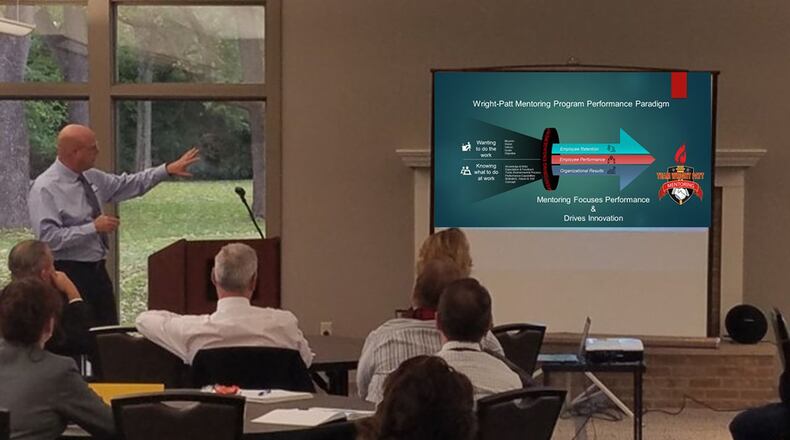Dr. Tom Tirey, Wright-Patterson Mentoring Program manager, 88th Force Support Squadron, noted that the fiscal 2019 program participants include active-duty service members and civilians and are drawn from all base organizations. The program is aligned with the principles and goals outlined by AFMAN 36-2643, the Air Force Mentoring Program.
“Our mentoring program gives mentors and mentees a chance to meet in person,” Tirey said. “It gives mentors a chance to give back and helps develop future leaders. Our program promotes growth, strengthens the Air Force and provides insight into the perspectives of our junior personnel.
“Mentoring works by creating cross-functional awareness, bridges generational barriers and increases organizational effectiveness by leveraging employee competence and commitment,” he said.
One of the changes to the program this year included the participants answering questions on what they wanted to get out of their experience and how they define personal and professional success.
While the Air Force’s success metrics are stated as retention, personal performance and organizational performance, individual success metrics may be
money, trust, power, appreciation, status, work/life balance, value, recognition, knowledge and position, according to a filter survey Tirey used to match mentors and mentees.
Mentees will be able to return to their survey when their year of mentoring ends Sept. 30, 2019, and consider whether they are closer to achieving their personal success goals.
“The purpose of mentoring programs is to assist us in achieving personal and professional success,” he said. “The Air Force wants us to leverage our abilities to meet the challenges of today and tomorrow. They want higher mission effectiveness and efficiencies.
“We get there by individually challenging ourselves to be better, and it has an accumulative, synergistic effect,” Tirey continued. “Our mentoring program can focus that performance effort, build upon it and foster innovation from its results.”
Studies have shown that most creative people have utilized mentoring during their lifetime.
“For many people, mentoring can be the final ‘puzzle piece’ which augments and completes an individual’s education, experience and skills,” the program manager said. “Mentoring can change everything.
“We have to get used to the idea that it’s OK to say, “I don’t know everything’ and to go to that person who can be a mentor – that guide who can help navigate our personal and business efforts,” Tirey said.
Other discussions during the kickoff presentation included the difference between mentoring and coaching, available mentoring resources and tools, and more.
Now paired, mentees and mentors will set their own schedules of contact at least once per month, whether face-to-face, by phone or via other electronic/digital means.
For more information about the Wright-Patterson Mentoring Program, email 88FSSFSDEDMentoringProgram@us.af.mil.
About the Author
